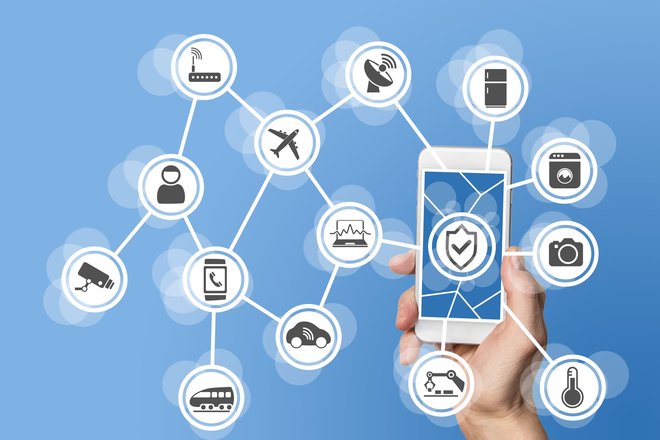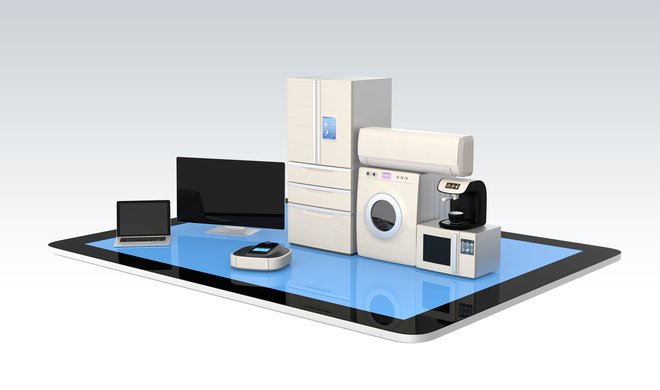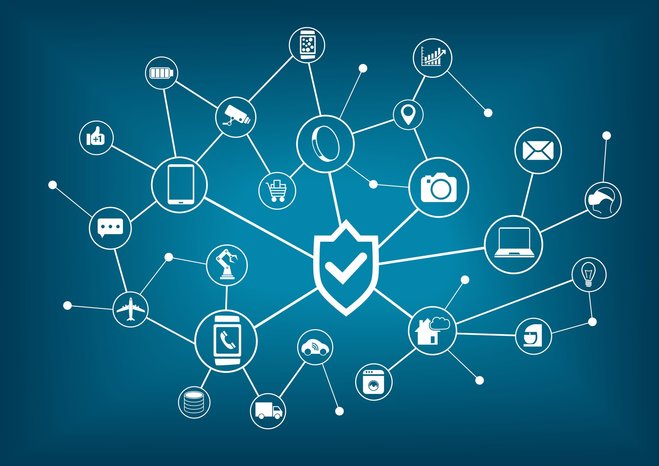We're all familiar with the Internet (otherwise, you wouldn't be reading this blog) yet some of its users are no longer human but robot vacuum cleaners, refrigerators or window blinds. And there's even more devices connected via Bluetooth! What sounded rather futuristic 5 years ago, has become more and more of a standard among current products. The idea is that intelligent devices can better assist their human owners. As with all new developments, products range from useful to ludicrous. Here's a brief outline.

In the realm of product development, some buzzwords are enough to make the mouths of even the most seasoned of marketing professionals water. Internet of things or IOT is one of those terms. After all, these products allow them to sell you many goods all over again - but this time the products are smart. At least that's what buyers tend to believe. As new sensors and ever smaller (and cheaper) transmitters and receivers are being developed, both common household appliances and industry robots are becoming "smarter". The idea is that consumers will enjoy both the devices and the accompanying apps that can monitor anything from heaters to coffee makers.
This is best demonstrated by smart homes. Bill Gates already owns one and many consider them to be the future also for regular consumers. Everything is remotely controllable, lights, temperatures and alarm systems. That's not all though, the house can also act and react autonomously. Lights go off as soon as you leave a room, security cameras monitor movement outside your front door and message you in case of an alert and window blinds constantly analyze the temperature and light intensity before they lower themselves automatically. The bath tub fills itself with water, on time and at just the right temperature while the washing machine pauses automatically whenever you decide to take a nap. Nice. This is supposed to save massive amounts of energy - and eventually make up for the higher initial costs. This begs the question of how much a smart device should cost and how long it must remain in operation before the greater investment is somewhat justified.
Yes, some products absolutely make sense. This includes devices that measure blood sugar for diabetics and display them via an app and athletes won't want to do without their wearables (wrist bands with pulse sensors, GPS, etc.), I can understand that. I like to check on the current location of my packages whenever I made an order and this wouldn't be possible without position tracking. In hospitals, medical devices recognize their patients and provide suitable infusions or diagnostic techniques. Many industries depend on this technology even the part of the shipping industry that merely unloads containers. But once again, development doesn't stop there and continues to extend to less reasonable use cases.

Honestly, who hasn't dreamed about reading their emails on their fridge? Well, I haven't and maybe that's not exactly a top priority for most of us, but it shows what is possible today - and this feature has actually made it into mass production. Useful or not? You'll be the judge of that. You can already create shopping lists through a 21 inch touch display and send them to your smartphone. Cameras enable you to view the inside of the fridge via app and help you plan your next shopping run. Once food items come with smart labels (planning is under way), you'll be able to instantly list expired products - and reorder them automatically. It's only a matter of time and, naturally, depends on whether consumers accept the new technology or not. After all, Bill Gates and a couple of nerds aren't enough to help this technology succeed.
Leaving costs and the effort it would take to adjust, program and monitor various devices aside, security is also a critical issue here. All these products depend on fairly new technology and are manufactured under immense cost pressure. Would you be willing to pay €20 more for additional features? Maybe, how about €40 for strong encryption? That's where many will draw the line. Even though they're made by multiple different companies, the devices will also have to communicate with each other - and in a secure fashion. That's not always the case as there have already been huge bot nets exclusively comprised of hacked WLAN-enabled cameras (also called IP cameras). Would you want your fridge to distribute spam mails? Hacks against medical appliances, industrial facilities, cars or toys have proven that there's a lot of catching up to do in terms of safety and security. The business is young and mandatory security standards have yet to emerge.
 No security concept - no network access!
No security concept - no network access!
It's not the annoying son of your neighbors that causes your radiator to act up with his laptop you should be worried about. Once criminals discover a vulnerability in an Internet-enabled product, they might be able to take over millions of them. We're not talking about computers with operating system that have seen years of development but tiny chips with minimal software footprints. The problem is that security is frequently either the last item on the developer's to-do list or the system was never designed to work as part of a large network in the first place. But whenever there's big money to be made, products are rushed to market - often lacking even rudimentary capabilities such as built-in malware checks or the ability to receive future security updates. The baby cam in your nursery may be handy but be aware that you may not be the only one watching.
You don't have to become a technology skeptic to take a more critical view. If there's a true need for network access - go ahead. But does this have to include coffee makers, vacuums or my radiator? Do I really want my smartphone to become the central hub for my household appliances? Ultimately, it's going to be a struggle between marketers, security fanatics and consumers with common sense.
What I would like to know: Are you already using smart devices or do you generally reject consumer products that require an online connection?




I already have quite enough problems with my house acting autonomously, thank you. It sheds its paint on a regular basis, it eats up my firewood, periodically cuts my electricity and/or my internet connection, gurgles with indigestion when the central heating is on and generally invents imaginative new ways to remind me that it's 230 years old.
Any smart device should be intelligent enough to give it a wide berth.
I was showing a pal my new car yesterday, he said "Are you sure it's not spying on you?"
We really need to address this ASAP - new devices are made available every day.. and nothing has changed since the DYN-DNS attack last October... Manufacturers need to make all users change the default ID and password... definitely a code change... but we need to start now....
I am interested in am encryption company called Device Authority which is owned by TERN (which is the name of the share on the stock market) which seems to have taken a huge leap forward in protecting connected devices. It is partnering with many large companies and has solved the problem of hacking. It's worth a look!
Consumers with common sense? Really? Just when do you expect that to ever happen??
While I don't necessarily reject smart devices, the only ones we're using now are the entertainment systems, and of course, the PCs and printer. I can, however, see the problems that can and will be created by people who have nothing constructive to do with their time.
Maybe I've become a grumpy old man but as one that have been in the forefront of technology for 50 years it seems that most of the new stuff is more useless than truly useful.
Like having a camera inside and a screen outside of the fridge - BFD. Better to have a fridge that exhausts the heat outside during home cooling season and distributes the heat inside during heating season. Duh!
Or my favorite - a smart phone that one can really see the screen outside in bright sunlight. Double duh!
I do believe it's inevitable that these products will come to the masses and once affordable will be embraced as past technologies have. I for one have no interest network connected fridges, washing machines, etc, as machines I have do want I need them to do. No more, no less. I too can't think of a time when I thought "I wish the tumble drier could play Doom!" I have my pc for that. I love technology and there is no doubt it has made life a great deal better but technology for the sake of it goes beyond what we as a race need to have but more what we as a race need to create.
Hi Sven,
No, I do not want a smart home or a smart piece of equipment to perform an action which I can, and have the desire to perform myself.
I was born with dexterity and ability to perform household tasks, drive a vehicle and visit stores to purchase my needs, and occasionally something I want.
Let the robotics and 'smart stuff' be beneficial to the unwell, the infirm and the invalid people in our midst, they are only wanted, not needed by fit, healthy, dexterous humans, many of whom attend a gymnasium while the 'robots' perform the household tasks....????
I have a computer to send and receive mail, to research my favourite subjects, Ashampoo for my photographic and audio hobbies, and I peruse the specifications of products in which I am interested.
My mobile 'phone is a relic which works perfectly and I take it when I am away from home for emergencies only.
Life is fun being a self-reliant human being, with a wife who thinks and acts in a similar manner to me.
I have given in to Alexa and the WiFi control of lights, music, book reading etc. I have even installed cameras for security that text me if they detect movement and i can then "look in" on things. I have not and will not give up my physical key to my home to allow electronic locking/unlocking of doors even with the use of cryptic passkeys/codes.
I note the dearth of comments. I was slow to respond myself on the grounds that putting comments on blogs often attracts responses that are less than considered and one wonders why bother. However your blog makes sense, common or not and needs encouragement. I agree with your scepticism and yes there is no way that at the moment I would consider buying on line connected fridges, light switches, heaters, air cons, monitoring systems and so on. The risks are not just to individual privacy & denial of service attacks but also power system security and a host of un-thought of societal complications. Security fanatic? Common sense? Might be same thing.
We tend to be getting lazy, not only physically but mentally. We want someone else to do the work and our thinking for us. In many ways we are 'long term' selfish lazy. Gone are the days of making an article that lasts and we call it 'planned obsolete'. Like everything we use it is a 'double edged sword. If it lasts there is no need to replace it, so the maker goes out of business and the staff is made redundant. Apps that do the thinking for us does away with the exercise we use in 'thinking. Our brain is like a muscle, it also needs to be exercised and without that it tends to shrivel just like an unused muscle. We are what WE think, not what others think for us. The ease of recall (remembering) is governed by the impression the original information made on you at the time you first saw or heard it. These applications are not meant to be a replacement but an 'add-on'. It took original thought to compose the application. It took thought to compose this comment.
As we are all individuals and able to think for ourselves, the comments will also vary.
Professor Steven Hawking has a 'shrivelled' body but a well exercised brilliant mind.
Oh Dear,
And I am soooo happy with my 10 year old Nokia C2.
At least I can talk in peace without thinking about hackers.
Albert